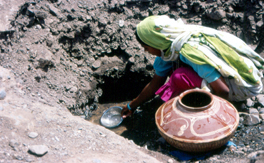Drought and water scarcity
This publication shows how the three pillars of drought management: (1) monitoring; (2) vulnerability assessment; and (3) risk mitigation and response, help to integrate the management of the two phenomena.
This publication shows how the three pillars of drought management: (1) monitoring; (2) vulnerability assessment; and (3) risk mitigation and response, help to integrate the management of the two phenomena.
Globally, irrigated agriculture is the largest abstractor and predominant consumer of groundwater resources. In many arid and drought-prone areas, unconstrained use is causing serious aquifer depletion
Water and its management is becoming not just a local but a global priority. The UN Rio+20 Declaration emphasises the need to establish a green economy as the means to achieving sustainable development
Urban water management is now on the verge of a revolution in response to rapidly escalating urban demands for water as well as the need to make urban water systems more resilient to climate change. Growing
Integrated Water Resources Management (IWRM) should be organized on the relevant scale of the basins of rivers, lakes and aquifers, especially when they are transboundary. But significant progress should
The global focus on the threats posed by climate change has drawn attention to the fact that water will be the medium through which many of its impacts will be felt. In addition to the direct impacts of
The twin engines of urbanisation and resource depletion will undermine efforts to achieve water security: water availability will be eroded and conflicts will escalate. The assumptions underlying conventional

<p> This new paper by Global Water Partnership sets out an overarching framework for the analysis of equity in the context of water development and management.</p>
The Global Water Partnership (GWP) and the International Water Management Institute (IWMI) held a workshop of policymakers and international and regional experts working on the South Asian region in Colombo,
This handbook provides guidance for improving the governance of freshwater resources, in particular through effective implementation of the integrated water resources management
Advancing water security to reduce poverty and environmental degradation. Ensuring that water is a key part of national development amid growing competition for water. Addressing critical development challenges to water security such as climate change. These goals lie at the heart of the vision and mission of GWP and its partners.